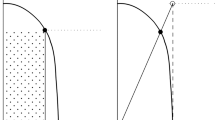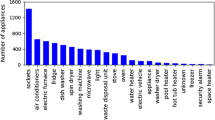Abstract
Nowadays, energy represents the most important resource; however, we need to face several energy-related rising issues, one main concern is how energy is consumed. In particular, how we can stimulate consumers on a specific behaviour. In this work, we present a model facing energy allocation and payment. Thus, we start with the explanation of the first step of our work concerning a mechanism design approach for energy allocation among consumers. More in details, we go deep into the formal description of the energy model and users’ consumption profiles. We aim to select the optimal consumption profile for every user avoiding consumption peaks when the total required energy could exceed the energy production. The mechanism will be able to drive users in shifting energy consumptions in different hours of the day. The next step concerns a payment estimation problem which involves a community of users and an energy distributor (or producer). Our aim is to compute payments for every user in the community according to the single user’s consumption, the community’s consumption and the available energy. By computing community-dependent energy bills, our model stimulates a users’ virtuous behaviour, so that everyone approaches the production threshold as close as possible. Our payment function distributes incentives if the consumption is lower than the produced energy and penalties when the consumption exceeds the resources threshold, satisfying efficiency and fairness properties both from the community (efficiency as an economic equilibrium among sellers and buyers) and the single user (fairness as an economic measure of energy good-behaving) points of view.
Similar content being viewed by others
References
Ameren, C.: Day ahead pricing used for billing rtp and hss services. https://www2.ameren.com/RetailEnergy/realtimeprices.aspx (2012)
Barreto, C., Mojica-Nava, E., Quijano, N.: Design of mechanisms for demand response programs. In: 52nd IEEE Conference on Decision and Control, pp. 1828–1833. https://doi.org/10.1109/CDC.2013.6760148 (2013)
Castro, J., Gómez, D., Tejada, J.: Polynomial calculation of the shapley value based on sampling. Comput. Oper. Res. 36(5), 1726–1730 (2009). https://doi.org/10.1016/j.cor.2008.04.004. http://www.sciencedirect.com/science/article/pii/S0305054808000804, selected papers presented at the Tenth International Symposium on Locational Decisions (ISOLDE X)
Chorppath, A.K., Alpcan, T.: Mechanism design for energy efficiency in wireless networks. In: 2011 International Symposium on Modeling and Optimization in Mobile, Ad Hoc and Wireless Networks (WiOpt), pp 389–394. IEEE (2011)
Gellings, C.: The concept of demand-side management for electric utilities. Proc. IEEE 73(10), 1468–1470 (1985). https://doi.org/10.1109/PROC.1985.13318. iSSN. 0018–9219
Ghaemi, S., Brauner, G.: User behavior and patterns of electricity use for energy saving. Internationale Energiewirtschaftstagung an der TU Wien, IEWT (2009)
Jackson, M.O. In: Derigs, U (ed.) : Mechanism theory. EOLSS Publishers, Oxford (2003)
Littlechild, S.C., Owen, G.: A simple expression for the shapely value in a special case. Manag. Sci. 20(3), 370–372 (1973). http://www.jstor.org/stable/2629727
Mahmood, A., Ullah, M., Razzaq, S., Basit, A., Mustafa, U., Naeem, M., Javaid, N.: A new scheme for demand side management in future smart grid networks. Procedia. Comput. Sci. 32(Complete), 477–484 (2014). https://doi.org/10.1016/j.procs.2014.05.450
Narahari, Y.: Game Theory and Mechanism Design, World Scientific Publishing Company Pte. Limited, chap. 14 (2014)
Neumann, J.V., Morgenstern, O.: Theory of Games and Economic Behavior. Princeton University Press. http://jmvidal.cse.sc.edu/library/neumann44a.pdf (1944)
Nisan, N., Roughgarden, T., Tardos, E, Vazirani, V.V.: Algorithmic Game Theory. Cambridge University Press (2007)
OpenEI: Commercial and residential hourly load profiles for all tmy3 locations in the united states. http://en.openei.org/datasets/dataset/ (2017)
Operator CIS: Daily renewables watch. http://www.caiso.com/market/Pages/ReportsBulletins/DailyRenewablesWatch.aspx (2017)
Rad, A.H.M., Leon-Garcia, A: Optimal residential load control with price prediction in real-time electricity pricing environments. IEEE Trans, Smart Grid 1(2), 120–133 (2010). http://dblp.uni-trier.de/db/journals/tsg/tsg1.html#RadL10
Samadi, P., Schober, R., Wong, V.W.S.: Optimal energy consumption scheduling using mechanism design for the future smart grid. In: SmartGridComm, pp. 369–374. IEEE. http://dblp.uni-trier.de/db/conf/smartgridcomm/smartgridcomm2011.html#SamadiSW11 (2011)
Samadi, P., Mohsenian-Rad, H., Schober, R., Wong, V.W.S.: Advanced demand side management for the future smart grid using mechanism design. IEEE Trans. Smart. Grid. 3(3), 1170–1180 (2012). https://doi.org/10.1109/TSG.2012.2203341
Shapley, L.S.: Contributions to the Theory of Games (AM-28), vol. II. Princeton University Press. http://www.jstor.org/stable/j.ctt1b9x1zv (1953)
Shoham, Y., Leyton-Brown, K.: Multiagent Systems: Algorithmic, Game-Theoretic, and Logical Foundations. Cambridge University Press, New York (2008). chap. 10
Tsui, K.M., Chan, S.: Demand response optimization for smart home scheduling under real-time pricing. IEEE Trans. Smart. Grid. 3(4), 1812–1821 (2012). https://doi.org/10.1109/TSG.2012.2218835
Ullah, M.N., Mahmood, A., Razzaq, S., Ilahi, M., Khan, R.D., Javaid, N: A survey of different residential energy consumption controlling techniques for autonomous DSM in future smart grid communications. arXiv:1306.1134 (2013)
Upadhyaya, P., Balazinska, M., Suciu, D.: How to price shared optimizations in the cloud. Proc. VLDB Endow. 5(6), 562–573 (2012). https://doi.org/10.14778/2168651.2168657
Author information
Authors and Affiliations
Corresponding author
Additional information
Publisher’s note
Springer Nature remains neutral with regard to jurisdictional claims in published maps and institutional affiliations.
Rights and permissions
About this article
Cite this article
Giuliodori, P., Bistarelli, S. & Mugnai, D. Energy allocation and payment: a game-theoretic approach. Ann Math Artif Intell 88, 793–816 (2020). https://doi.org/10.1007/s10472-019-09685-z
Published:
Issue Date:
DOI: https://doi.org/10.1007/s10472-019-09685-z




